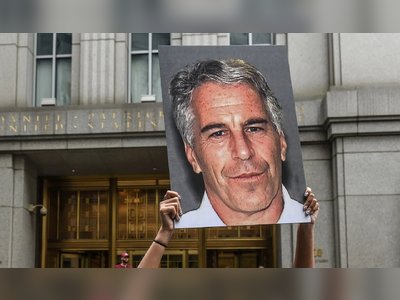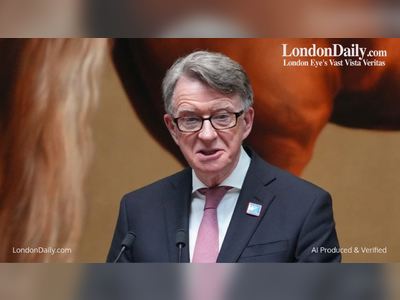China’s banking system begins to crack at its grass roots as two bank runs take place within a week
China’s US$40 trillion banking system is seeing growing signs of trouble at its grass roots with bank runs happening at two small local lenders last week, a sign that a mountain of debt and an unprecedented economic contraction has started to take a toll.
Local governments and police in both Baoding city in Hebei province and Yangquan, a coal mine town in Shanxi province, last week pleaded with customers not to withdraw cash from local banks despite various unsubstantiated rumours.
On Saturday, the city of Baoding said on its official WeChat account that Baoding Bank was operating normally and people “should not believe in or spread rumours … and should jointly be safeguarding good financial and social order” after a group of depositors rushed to withdraw money from the bank.
Local police issued a statement saying it had arrested two individuals for spreading rumours that led to “panic among the public”.
Three days earlier, the government and police in Yangquan were forced to issue a similar statement after local depositors rushed to Yangquan Commercial Bank.
According to a local government notice on Wednesday, the local government pleaded the public not to withdraw cash from the bank in groups and “be watchful of risks of holding a lot of cash”.
Local branches of China’s central bank and the banking regulator also issued statements seeking to assure the public that their savings at the banks were safe.
Phone calls made to both banks went unanswered on Tuesday.
Bank runs are not necessary for most savers as bank deposits in China are guaranteed up to 500,000 yuan (US$70,000) per bank, however, investment wealth management products and trust investment plans, which are popular among Chinese residents and are often sold via bank branches, are not protected.
The Bank of Gansu, which raised HK$6 billion (US$848,000) through an initial public offering in Hong Kong in January 2018, was hit by a bank run in April, while Yingkou Coastal Bank in the rust-belt province of Liaoning received a large volume of over-the-counter requests to withdraw cash in November.
And while bank runs are often calmed quickly after intervention by the local governments, they provide reminders of the troubled balance sheets of small Chinese banks amid souring loans and darkening growth prospects which have been exacerbated by the coronavirus.
Baoding Bank said in its financial statements that its non-performing loan ratio had increased steadily to 2.12 per cent at the end of 2019 from 2.09 per cent in 2018 and 1.84 per cent in 2017.
Yangquan Bank has not published its 2019 data, but its non-performing loan ratio had more than doubled to 2.57 per cent in 2018 from 1.03 per cent at the end of 2017.
The emergence of small lenders in China in the last decade is the result of the state-led growth model which in turn has promoted local governments’ debt-fuelled spending. However, many are now facing a mix of problems including rising non-performing loans, insufficient capital and poor governance.
According to figures released by the China Banking and Insurance Regulatory Commission, the average non-performing loans ratio at city commercial banks – a group that includes both Baoding Bank and Yangquan Commercial Bank – was 2.45 per cent as of the first quarter of 2020, about 1.7 times of the average of 1.41 per cent for big four state banks over the same period.
But the real picture could be much worse after the central government last year took control of Baoshang Bank as the lender in Inner Mongolia, once a star performer, was unable to sustain operations and was recapitalised and reformed.
Last year, the central government was also forced to bail out the Bank of Jinzhou and Hengfeng Bank.
“What we’ve seen is that in many occasions, in cities and counties, there are some consolidations in small lenders,” said Steven Chan, executive director of equity research at Haitong International. “Especially the very weak ones.”
For the Chinese financial authority under Vice-Premier Liu He, the bottom line is that problems at individual institutions will not evolve into “systemic risks”. The pressure to solve the problems of local institutions are often put on local authorities, and Beijing is very discreet in directly bailing out local banks.
The small banks’ woes come at a time when Beijing needs them the most as the Chinese authority is relying on small lenders, which often serve small businesses, to provide credit to factories and farms so that the so-called economic cells of the Chinese economy can survive the impact of the coronavirus.
China’s banking regulator is drafting a plan concerning recapitalisation of small lenders, although details have yet to be published. According to the 21st Century Business Herald, China is thinking of selling 200 billion yuan (US$28 billion) worth special bonds, usually used to fund infrastructure projects, to raise funds for the state owners of local banks.
“We expect the slowing of loan growth for regional banks to continue in the rest of 2020 as regulators act to resolve the most vulnerable regional banks,” said Moody’s in a report published last week, adding that city commercial banks’ lower profitability also makes it unlikely that they can replenish their capital by earnings alone.












